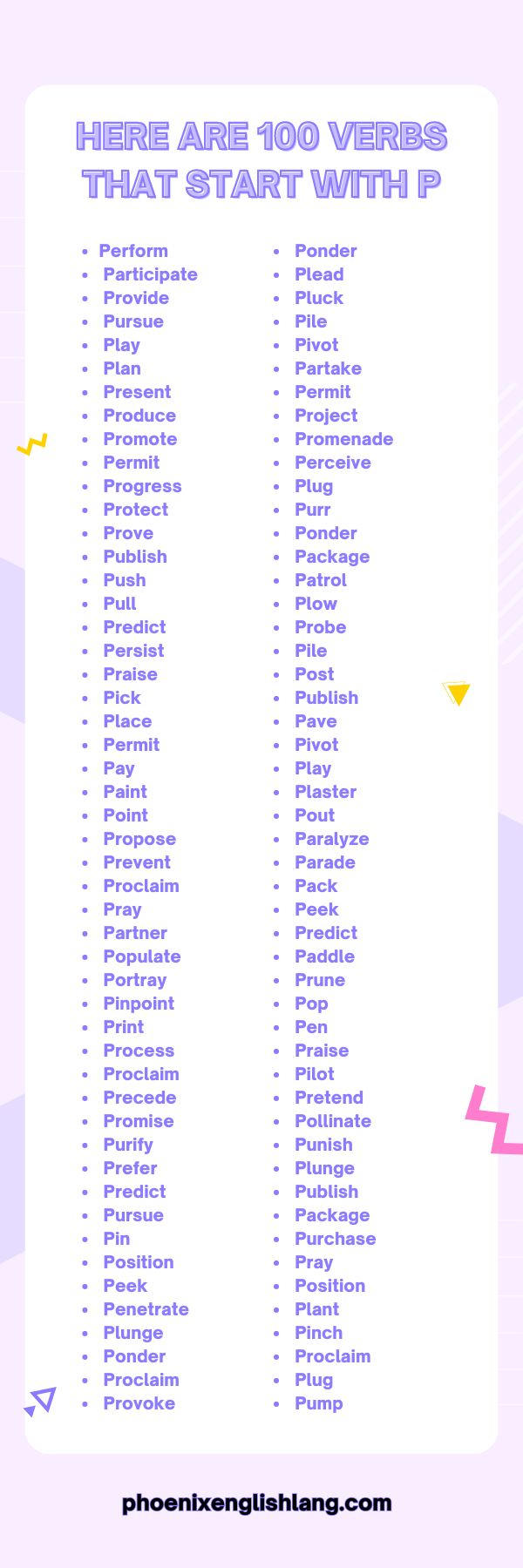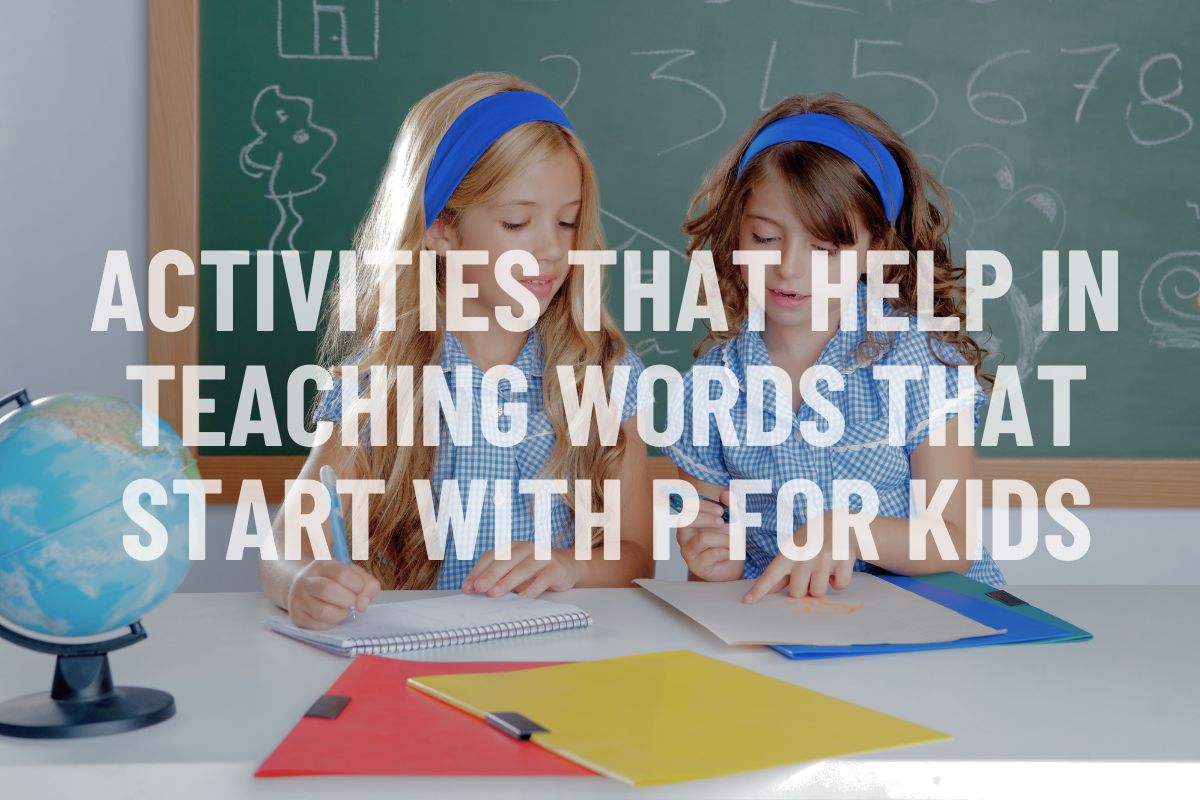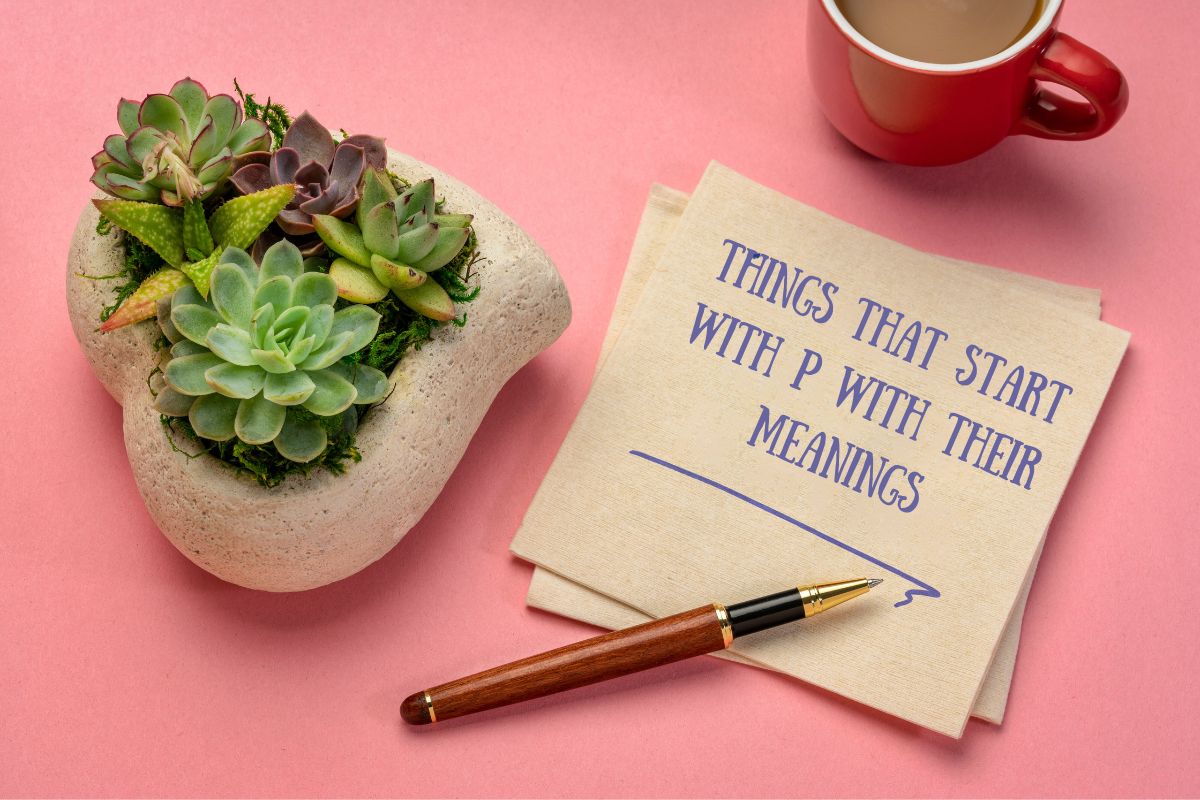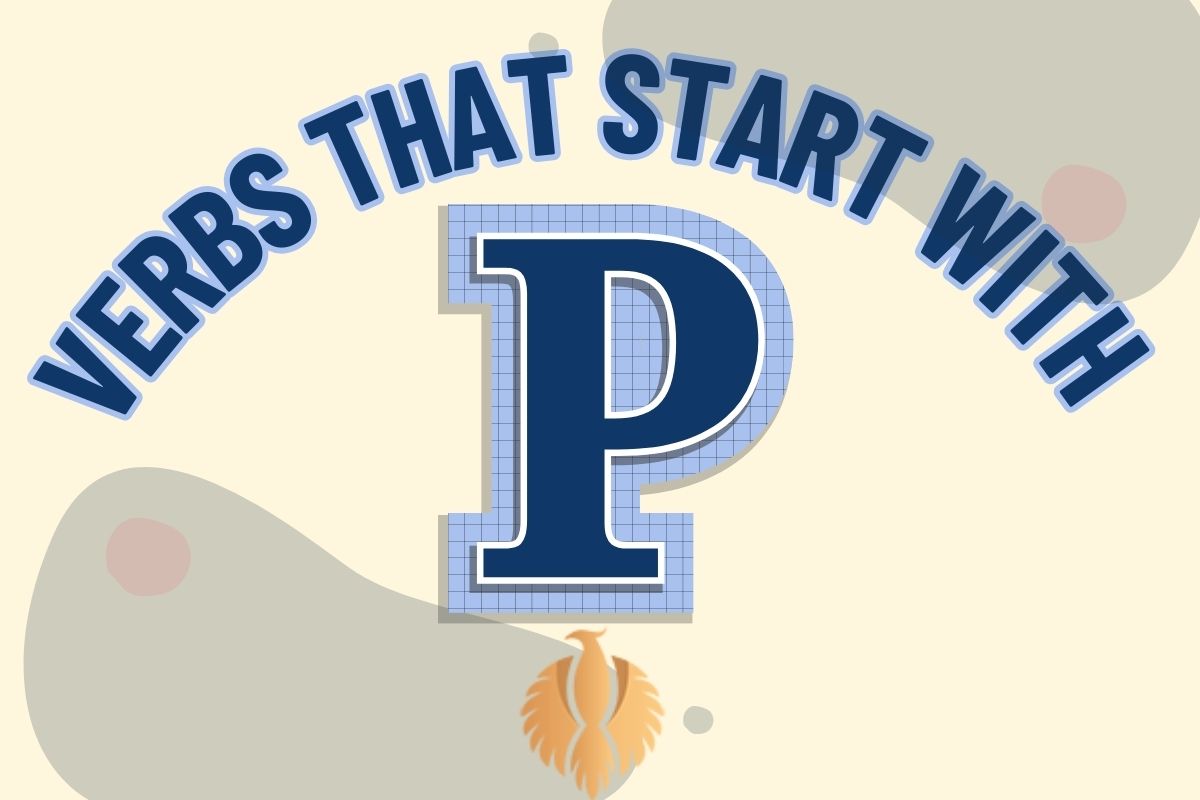Verbs are the action words in a sentence that express what a subject is doing or the state of being. When it comes to verbs that start with the letter “P,” there is a plethora of options that bring dynamism and movement to our language.
Here is an article highlighting some notable verbs that start with “P” and their significance. So keep on reading it all if you are interested to learn more!
One important verb that starts with “P” is “perform.” When we perform, we showcase our skills or talents in a particular activity or task.
Whether it’s a musician playing an instrument, an actor delivering a captivating performance, or an athlete demonstrating their abilities on the field, performing allows us to express ourselves and captivate an audience.
Another powerful verb is “persuade.” When we persuade, we use reasoning, evidence, and effective communication to convince others to adopt a particular opinion or take a specific action.
Persuasion plays a significant role in various aspects of life, from advertising and marketing to politics and personal relationships. The ability to persuade effectively can influence decisions and shape outcomes.
“Ponder” is a verb that encourages deep reflection and contemplation. When we ponder, we engage in introspection and consider various perspectives and possibilities.
Pondering helps us gain insights, make informed decisions, and understand complex situations better. It is a verb that encourages critical thinking and intellectual growth.
“Promote” is a verb that involves advocating for or supporting the advancement or growth of something or someone. Whether it’s promoting a product, a cause, or a person’s career, this verb encompasses activities aimed at creating awareness, generating interest, and encouraging progress.
Promotion is often used in marketing and business contexts but can also apply to personal and social endeavors.
The verb “persevere” embodies determination and resilience in the face of challenges. When we persevere, we continue to pursue our goals or overcome obstacles despite difficulties or setbacks.
It is a verb that demonstrates strength of character and the willingness to push through adversity. Perseverance is often associated with personal growth and achievement.
“Praise” is a verb that involves expressing approval, admiration, or gratitude towards someone or something. When we praise, we acknowledge and appreciate the accomplishments, qualities, or efforts of others.
Praising not only boosts the morale and confidence of individuals but also fosters a positive and supportive environment. It is an essential verb in building relationships and motivating others.
Another verb that starts with “P” is “propose.” When we propose, we put forward an idea, plan, or solution for consideration or discussion.
Proposing is about presenting a suggestion or recommendation with the intention of initiating change or progress. This verb is commonly used in professional and personal contexts, such as proposing a business strategy or proposing marriage.
Lastly, “participate” is a verb that signifies involvement and active engagement. When we participate, we take part in an activity, event, or process. Participation fosters collaboration, teamwork, and a sense of belonging.
It is a verb that encourages contribution and active citizenship in various domains, such as sports, community initiatives, and social movements.
These are just a few examples of verbs that start with the letter “P” and the significance they hold. Each of these verbs brings action, meaning, and impact to our language and communication.
Exploring the world of “P” verbs allows us to express ourselves more dynamically and effectively, enabling us to convey our thoughts, emotions, and intentions with precision and clarity.
“Pondering poetic possibilities, passionate verbs beginning with ‘P’ permeate prose, painting vivid pictures and propelling narratives. From playful prancing to profound pondering, these powerful words punctuate language, portraying a panorama of actions and emotions.
Let’s explore this palette of verbs, where precision meets expression, and where the pulsating pulse of verbs commences with ‘P’.
“Embarking on a linguistic journey through the alphabet, we delve into the realm of verbs that commence with the letter ‘P.’ These potent verbs populate our language with a plethora of actions, each imbued with its own distinctive nuance.
From the rhythmic pace of verbs like ‘parade’ and ‘prance’ to the contemplative nature of ‘ponder’ and ‘reflect,’ the lexicon unfolds as a rich tapestry of movement and meaning. Let’s navigate this linguistic landscape, exploring the dynamic verbs that propel our communication with precision and flair.”
You might also enjoy: 100 ;Home; Idioms and Expressions In 2024
Here are 100 verbs that start with P

- Perform
- Participate
- Provide
- Pursue
- Play
- Plan
- Present
- Produce
- Promote
- Permit
- Progress
- Protect
- Prove
- Publish
- Push
- Pull
- Predict
- Persist
- Praise
- Pick
- Place
- Permit
- Pay
- Paint
- Point
- Propose
- Prevent
- Proclaim
- Pray
- Partner
- Populate
- Portray
- Pinpoint
- Process
- Proclaim
- Precede
- Promise
- Purify
- Prefer
- Predict
- Pursue
- Pin
- Position
- Peek
- Penetrate
- Plunge
- Ponder
- Proclaim
- Provoke
- Ponder
- Plead
- Pluck
- Pile
- Pivot
- Partake
- Permit
- Project
- Promenade
- Perceive
- Plug
- Purr
- Ponder
- Package
- Patrol
- Plow
- Probe
- Pile
- Post
- Publish
- Pave
- Pivot
- Play
- Plaster
- Pout
- Paralyze
- Parade
- Pack
- Peek
- Predict
- Paddle
- Prune
- Pop
- Pen
- Praise
- Pilot
- Pretend
- Pollinate
- Punish
- Plunge
- Publish
- Package
- Purchase
- Pray
- Position
- Plant
- Pinch
- Proclaim
- Plug
- Pump
These are just a few examples; the English language boasts a diverse array of verbs that begin with the letter ‘P.’
Here are 20 adjectives starting with P
- Pensive
- Playful
- Profound
- Pleasant
- Powerful
- Pristine
- Patient
- Polished
- Precise
- Prudent
- Peculiar
- Pungent
- Pliable
- Placid
- Piquant
- Precious
- Pompous
- Proficient
- Petite
- Palatable
Here are 20 adverbs starting with P
- Promptly
- Pleasantly
- Partially
- Particularly
- Patiently
- Perfectly
- Precisely
- Passionately
- Properly
- Politely
- Persistently
- Profoundly
- Personally
- Playfully
- Proudly
- Quickly
- Quietly
- Quirkily
- Perhaps
- Poorly
You might also enjoy: Top 100 Commonly Used Verbs That Start With R [2024]
Exploring the Enigmatic: A Compilation of Vibrant Verbs Beginning with p

Verbs are the backbone of any sentence, adding action, movement, and vivacity to our language.
When it comes to verbs that start with the letter “P,” there is a captivating collection that infuses our sentences with energy and intrigue. Let’s embark on a journey through the enigmatic world of vibrant verbs that start with “P”:
1. Pulsate
To beat or throb rhythmically, pulsate evokes a sense of vitality and life. It describes the rhythmic movement of a heart or the vibrant energy of a bustling city.
2. Propel
To drive or push forward, propel conjures images of acceleration, movement, and progress. It signifies the force that propels a rocket into space or the motivation that drives us towards our goals.
3. Pique
To arouse curiosity or interest, pique captivates our attention and ignites our desire to learn more. It represents that moment of intrigue that sparks our curiosity and prompts us to explore further.
4. Permeate
To spread or penetrate throughout, permeate describes the process by which something diffuses or seeps into every part. It signifies the gradual and all-encompassing presence of a scent, a feeling, or an idea.
5. Prance
To move with lively steps, prance embodies a playful and spirited movement. It evokes images of a horse joyfully skipping or a dancer gracefully leaping across the stage.
6. Prowl
To move stealthily and cautiously, prowl suggests a sense of curiosity and intrigue. It is the verb that describes the movement of a predator as it silently stalks its prey.
7. Plunge
To dive or descend rapidly, plunge conveys a sense of adventurous daring and sudden motion. It represents the exhilarating act of diving into water or taking a leap of faith.
8. Paralyze
To render immobile or unable to act, paralyze depicts a state of complete stillness and inaction. It represents the loss of movement or control, whether physical or metaphorical.
9. Patronize
To support or be a customer of, patronize implies a sense of favor or support. It can mean providing financial support to a business or showing condescending behavior towards someone.
10. Purify
To cleanse or make pure, purify signifies the process of removing impurities or contaminants. It represents the transformation from something tainted to something pristine and untainted.
11. Pluck
To pull or pick with a sudden movement, pluck embodies a swift and decisive action. It can refer to plucking a flower, plucking a guitar string, or plucking up the courage to face a challenge.
12. Proclaim
To announce or declare publicly, proclaim conveys a sense of authority and conviction. It represents the act of making a bold statement or declaring a significant truth.
13. Preside
To be in charge or have authority over, preside signifies the act of leading or overseeing a gathering or event. It embodies the role of authority and control in a particular setting.
14. Promulgate
To make known or promote widely, promulgate suggests the dissemination of information or ideas to a broad audience. It represents the act of spreading knowledge or making an announcement.
15. Pantomime
To express or convey something through gestures and body movements, pantomime allows communication without words. It is a form of nonverbal expression that relies on physical movements and facial expressions.
These vibrant verbs that start with “P” add depth and excitement to our language, allowing us to paint vivid pictures and convey a range of emotions.
Exploring the enigmatic world of these verbs opens up a treasure trove of possibilities, enabling us to express ourselves with creativity and flair. So, let us embrace the power of these vibrant verbs and infuse our sentences with their energy and charm.
You might also enjoy: Top 100 Commonly Used Verbs That Start With O [2024]
Activities that Help in Teaching Words that Start with p for Kids

Teaching words that start with the letter “P” to kids can be a fun and engaging experience. Here are some activities that can help in teaching and reinforcing these words:
1. Picture Sorting
Prepare a collection of picture cards or printouts that represent words starting with “P.” Show the pictures to the kids and ask them to sort them into groups based on their initial sound. This activity helps them associate the visual representation with the corresponding sound.
2. Pictionary
Play a game of Pictionary using words that start with “P.” Divide the kids into teams and give each team a set of word cards. One person from each team has to pick a card and draw a picture representing the word while their team members guess the word. This game encourages creativity and vocabulary recall.
3. Puzzles and Matching Games
Create puzzles or matching games using pictures or words that start with “P.” Cut out pictures or write words on separate cards and mix them up.
Kids have to match the pictures with their corresponding words, or they can solve the puzzles by putting the pieces together.
4. Alphabet Hunt
Give each child a small basket or bag and ask them to go on an alphabet hunt around the house or classroom.
Their task is to find objects that start with the letter “P” and collect them in their basket. This activity helps reinforce vocabulary and letter recognition.
5. Popping Phonemes
Write words that start with “P” on separate pieces of paper and place them in a bowl or container. 2Give each child a small balloon and ask them to choose a word from the container.
They have to say the word and then “pop” the balloon with their word by stomping on it. This activity combines phonics practice with a fun physical element.
6. Puppet Show
Have a puppet show where the puppets act out different words that start with “P.” Encourage the kids to participate by suggesting actions and creating their own puppet characters. This interactive activity helps reinforce vocabulary and encourages imaginative play.
7. Poems and Songs
Create simple poems or songs using words that start with “P.” Sing or recite the poems/songs together as a group, emphasizing the initial sound of each word. This activity helps with phonemic awareness and memory retention.
8. Puzzling Puzzles
Create word puzzles or crosswords using words that start with “P.” Provide clues or descriptions for each word, and kids have to figure out the corresponding word to fill in the puzzle. This activity promotes problem-solving skills and vocabulary recall.
Remember to make these activities age-appropriate and adjust the level of difficulty based on the kids’ abilities. Incorporating hands-on and interactive experiences helps make learning enjoyable and memorable for children.
Things that Start with p with their Meanings

Here’s a list of things that start with ‘P’ along with their meanings:
| 1. Penguin:A flightless bird native to the Southern Hemisphere, known for its distinctive black and white plumage. |
| 2. Piano:A musical instrument with keys that produce sounds when struck by hammers. |
| 3. Photograph: A captured image created by exposing light-sensitive film or digital sensors. |
| 4. Planet: A celestial body that orbits a star, like Earth in our solar system. |
| 5. Palette:A flat surface used by artists to mix and blend colors during painting. |
| 6. Paradise: A place or state of complete bliss, happiness, and perfection. |
| 7. Phenomenon: A remarkable or exceptional event or occurrence. |
| 8. Palindrome: A word, phrase, or sequence that reads the same backward as forward (e.g., “level” or “radar”). |
| 9. Pyramid:A geometric shape with a polygonal base and triangular sides, or a monumental structure with such a shape. |
| 10. Pendulum: A weight suspended from a fixed point that swings back and forth under the influence of gravity. |
These are just a few examples, showcasing the diversity of concepts associated with the letter ‘P.’
You might also enjoy: Top 100 Commonly Used Verbs that Start with A
How do you identify p verb in a sentence?
To identify a verb that starts with the letter “P” in a sentence, you can follow these steps:
1. Understand what a verb is
A verb is a word that expresses an action, occurrence, or state of being in a sentence. Verbs are often the main component that shows what the subject is doing or the condition it is in.
2. Read the sentence
Read the sentence carefully to identify the words that describe an action or state of being.
3. Look for words starting with “P”
Pay attention to words in the sentence that start with the letter “P.” These words have the potential to be verbs that start with “P.”
4. Determine if the word is a verb
Once you have identified a word starting with “P,” determine if it is being used as a verb in the sentence. A verb should show an action, occurrence, or state of being.
5. Consider the context
Consider the context of the sentence to help you determine if the word is being used as a verb. Look for clues such as the subject of the sentence performing an action or the word describing a state of being.
6. Confirm with the definition
If you are unsure, you can consult a dictionary or online resource to verify if the word is indeed a verb that starts with “P.”
It’s important to note that not all words starting with “P” in a sentence will be verbs. Some may be nouns, adjectives, or other parts of speech. Understanding the role and function of a word in a sentence will help you correctly identify if it is a verb or not.
Conclusion
In conclusion, verbs that start with the letter “P” offer a rich tapestry of action, movement, and expression that can significantly enhance our communication.
Throughout this article, we have explored a diverse array of verbs beginning with “P,” each bringing its own unique flavor and dynamism to the English language.
The journey through these verbs has highlighted their significance in various contexts. From “perform,” which showcases our talents and skills, to “persuade,” which involves convincing others through effective communication, these verbs are integral to our daily interactions. They enable us to express ourselves more vividly and accurately, whether we are engaging in casual conversation, professional discourse, or creative writing.
One of the standout verbs is “ponder,” which encourages deep reflection and critical thinking.
This verb invites us to slow down and consider different perspectives, fostering intellectual growth and informed decision-making. Similarly, “promote” is a verb that underscores the importance of advocacy and support, whether in marketing, personal growth, or social causes.
It reminds us of the power of encouragement and the impact of raising awareness.
The verb “persevere” embodies resilience and determination, qualities that are essential for overcoming challenges and achieving our goals. It serves as a reminder that persistence in the face of adversity is often the key to success.
On the other hand, “praise” highlights the importance of recognizing and appreciating the efforts and accomplishments of others, fostering a positive and supportive environment.
“Propose” and “participate” are verbs that emphasize the value of active engagement and contribution.
Whether we are putting forward ideas for consideration or taking part in activities and events, these verbs encourage collaboration and teamwork.
They remind us that our involvement and input are crucial for progress and innovation.
Exploring these verbs also reveals the beauty of language and its ability to convey a wide range of emotions and actions.
Verbs like “prance,” “plunge,” and “prow” add a sense of playfulness, adventure, and intrigue to our expressions.
They allow us to paint vivid pictures with our words, making our communication more engaging and impactful.
Moreover, the activities suggested for teaching words that start with “P” to kids highlight the importance of interactive and hands-on learning. These activities not only make learning enjoyable but also reinforce vocabulary and phonemic awareness, laying a strong foundation for language development.
In summary, the verbs that start with “P” are a testament to the richness and versatility of the English language. They empower us to express ourselves with precision, creativity, and confidence.
By incorporating these verbs into our vocabulary, we can enhance our communication skills and connect more effectively with others.
As we continue to explore and embrace the dynamic world of “P” verbs, let us remember that language is a powerful tool. It allows us to share our thoughts, emotions, and experiences, bridging gaps and building relationships.
So, let us celebrate the vibrancy of these verbs and use them to infuse our language with energy, clarity, and charm

Hi, welcome to my blog! My name is Omid and I am thrilled to have you here! I am an English language teacher with 12 years of experience and hold multiple international certifications (TESOL, IELTS, TOEFL, PTE, CELTA). Additionally, I hold a PhD in Applied Linguistics with a specialization in Teaching English as a Second Language (TESL), which fuels my passion for teaching English and assisting others in mastering the language. To me, nothing is more rewarding than helping individuals enhance their English language abilities through various methods. So, let’s embark on this journey of learning English together.




